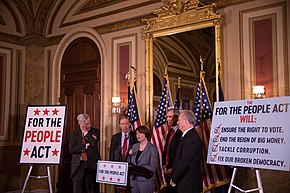Voting Rights Legislation 2021
Voting Rights Legislation 2021
by Linda Geller-Schwartz
Co-Chair Voting Rights Coalition
Now that a reformist administration is on the verge of being inaugurated in D.C., we can anticipate that some of the most urgent changes in national voting laws will have a chance of being implemented. During the last Congress, two bills, H.R. 1, For the People’s Act and H.R.4, The John Lewis Voting Rights Advancement Act were passed by the House of Representatives, but never taken up for consideration in the Senate. With some modifications to address the problems that occurred during the 2020 Election, we know that both bills will be re-introduced during the 117th Congress.
H.R.1, For the People Act is comprehensive voting legislation that would, inter alia, make voting easier and more accessible; lower barriers to running for office by addressing the problem of money in politics; and require independent redistricting commissions. The Brennan Center calls it “historic legislation that contains key reforms to revitalize American democracy”. (For a complete summary of this 706-page bill, go here or for an annotated bill click here ).
 One of the most important proposed changes in H.R.1 is a requirement for automatic voter registration. The United States is the only major democracy in the world that puts the onus on individual citizens to navigate a bureaucratic system to register to vote. Elsewhere, governments consider it their responsibility to ensure that all citizens are registered. Sixteen states and the District of Columbia already have automatic voter registration. H.R.1 would make such a system the national standard. When an individual interacted with any designated government agency (e.g. Social Security), he or she would automatically be registered to vote unless the person decided to opt-out. Such an automatic registration system would likely add millions of voters to the rolls and be less costly and more efficient than the current systems.
One of the most important proposed changes in H.R.1 is a requirement for automatic voter registration. The United States is the only major democracy in the world that puts the onus on individual citizens to navigate a bureaucratic system to register to vote. Elsewhere, governments consider it their responsibility to ensure that all citizens are registered. Sixteen states and the District of Columbia already have automatic voter registration. H.R.1 would make such a system the national standard. When an individual interacted with any designated government agency (e.g. Social Security), he or she would automatically be registered to vote unless the person decided to opt-out. Such an automatic registration system would likely add millions of voters to the rolls and be less costly and more efficient than the current systems.
Another proposed change in H.R.1, of particular interest to Florida, is the establishment of a national standard of same-day voter registration. Florida’s voter registration deadline, 29 days ahead of any election, is one of the earliest in the country. Twenty-one states (and D.C.) have passed some form of same-day registration, either on election day, during early voting, or both. With our system of online registration and the use of electronic poll books, same-day voter registration could be easily implemented.
H.R. 1 is replete with key reforms to our voting system but perhaps none is as crucial as the establishment of a small donor matching program to get big money out of financing elections. Candidates would opt into the system by raising enough small start-up donations to qualify and accepting certain conditions such as lower contribution limits. These individual donations of $1-$200 would be matched by public money at a six-to-one ratio. This is by no means a new concept. It has been used in states as well as locally (e.g. New York City). Even most major-party presidential candidates between 1976 to 2008 used matching funds in their primary campaigns. Addressing money in politics really does need to be one of the priorities of America to sustain our democracy.
Just to note one more essential provision in H.R. 1. To tackle the terrible problem of gerrymandering in America, the bill proposes that states use independent redistricting commissions to draw congressional maps. If we could require a uniform set of rules to draw districts and insist that map-drawing by done by commissions untainted by purely political considerations, this would go a long way to reinvigorate our electoral system.
H.R.4, The John Lewis Voting Rights Advancement Act, also must be a priority for the New Congress in order to address the immense amount of damage that the 2013 Supreme Court decision, Shelby County v. Holder, did to the Voting Rights Act of 1965. The Voting Rights Act has widely been recognized as the most important Civil Rights legislation that this country ever passed. When the Supreme Court eviscerated the provision in the Act that required designated states and localities that had a history of racial discrimination to get preclearance from the Department of Justice or a court before they changed their voting laws, the floodgate opened to all sorts of discriminatory changes by the states. For example, ID laws were introduced, polling places in minority areas were closed, and voter purges occurred. H.R.4 responds to the Supreme Court decision by updating the Voting Rights Act and making it functional again to stop discriminatory voting practices.
No doubt we may see some election legislation at the state level in Florida, but we should also pay attention to the progress of both these bills in the 117th Congress. If they were to pass, we could be much more optimistic about the future of American democracy.
About the Author

Linda Geller Schwartz, Ph.D.
Board Member
Linda Geller Schwartz is a former adjunct professor at Florida Atlantic University in the Women’s Studies Center and the Department of Sociology. Her principal areas of focus were problems facing women in the workplace, including sexual harassment and occupational sex segregation. Linda was also the director general of the Women’s Bureau in the Federal Department of Labor in Canada, and a senior policy advisor in the government.
Related Articles
Reciprocity, Fairness Must Guide Israel, West’s Mideast Strategy
President Joe Biden, along with the leaders of Great Britain, France, and Germany, recently rallied around Israel when Iran attacked it.
Such support constituted an inflection point, given Biden’s harsh criticism of Israel’s conduct in the war in Gaza.
The American Evangelical Response To October 7
No one was shocked when leading American Evangelical Christians – long known for
their stalwart defense of Israeli governments, offered overwhelming support for the Jewish
state’s strong military response to the brutal October 7, 2023, Hamas massacres in southern
Israel. Yet, a close look at data on American Evangelicals from recent years reveals that the
community’s ironclad support of Jerusalem’s government seems poised for a decline in the
coming years. This happens as younger generations seem less unquestioning of Israel – an issue
also faced in the American Jewish community – and the number of self-identified Evangelicals
themselves drops as a percentage of the American population.
Biden, Schumer, Borrel, And Mainstream Media: A Building Block Of Inaccuracies – OpEd
In a surprising speech, Senate Majority Leader Charles (“Chuck”) Schumer urged new elections in Israel, suggesting Prime Minister Benjamin Netanyahu is not up to the task of leading his country. President Biden embraced Senator Schumer’s speech.
There are enough reasons why Netanyahu deserves to be removed by his people, particularly the failure of his government to protect Israel’s southern border on October 7.
However, there is something much more severe in Schumer’s speech.

The Center is a gathering of scholars, experts and community stakeholders, that engage in research and dialogue in an effort to create practical policy recommendations and solutions to current local, national, and international challenges.
EXPLORE THE CENTER
FOCUS AREAS
©2019 The Palm Beach Center for Democracy and Policy Research. All Rights Reserved
